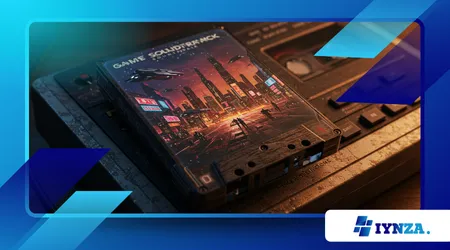Top 10 Game Soundtracks That Will Give You Chills

Some moments in gaming stay with you forever—not just because of the story or the action, but because of the music.
Anúncios
A powerful soundtrack can elevate a simple scene into something unforgettable. It stirs emotion, fuels adrenaline, and builds atmosphere in ways visuals alone never could. That’s the magic of great game soundtracks.
Whether it’s the somber strings of a final farewell or the pulse-pounding rhythm behind a climactic boss fight, music shapes the way we feel when we play.
And in 2025, with decades of incredible scores to draw from, it’s time to spotlight the soundtracks that still send shivers down our spines. These are the game soundtracks that do more than complement gameplay—they define it.
Why Music Matters in Games
Game soundtracks are designed not just to accompany gameplay, but to guide it emotionally. They sync with the player’s actions, reinforce themes, and heighten immersion.
Unlike films, where music leads you through a linear narrative, games respond to your decisions—making the music feel personal.
According to a 2024 survey by the Game Audio Network Guild, 78% of players said a game’s soundtrack directly influenced their emotional engagement with the story.
That’s not a minor detail—it’s a core part of how we experience games. Whether it’s fear, sorrow, triumph, or nostalgia, the right piece of music can amplify any emotion tenfold.
Read also: The best gaming desks for every budget.
What Makes a Soundtrack Give You Chills?
Not every great game soundtrack will give you goosebumps. The ones that do often share key qualities: emotional depth, powerful melodies, unexpected shifts, and a strong link to story moments.
It’s the sudden minor chord that hits during a betrayal. The rising swell as you reach the summit. The quiet piano as the credits roll after hours of chaos.
These moments stay with us because they aren’t just sounds—they’re tied to our memories. Think of music as the nervous system of a game: invisible, but vital to everything it feels.
Two Memorable Examples
Example 1: In “Journey,” the soundtrack rises with the wind as your character ascends a mountain.
The music, composed by Austin Wintory, syncs so perfectly with your movements that it feels like a duet between the game and your soul. By the end, you’re not just playing—you’re floating.
Example 2: In “Hollow Knight,” Christopher Larkin’s use of soft strings and haunting piano in the City of Tears transforms a crumbling ruin into a place of beauty and sorrow. The emotion comes not from words, but from the music echoing through silence.
How Soundtracks Evolve With Gameplay
The best soundtracks aren’t static—they evolve. In modern gaming, adaptive scores change based on what’s happening in the world. A battle theme intensifies as enemies appear.
A quiet theme returns, slower and more melancholic, when a character dies. These transitions are seamless, making music part of the player’s decision-making space.
Games like “Red Dead Redemption 2” and “God of War: Ragnarök” demonstrate how dynamic scoring creates tension, breathes emotion into combat, and underscores character development.
One piece of music might shift four or five times during a single mission, following your every move.
An Analogy Worth Remembering
Think of game music like the lighting in a theater. You might not always notice it, but it shapes everything you feel. Bright light sets urgency. Dim light brings tension.
Soundtracks do the same—subtle when needed, explosive when earned. Without them, even the most thrilling moment can feel flat.
Game Soundtracks That Made History
While this list isn’t exhaustive, here are ten iconic game soundtracks that consistently appear in conversations about music that gives players chills:
- The Legend of Zelda: Ocarina of Time – Koji Kondo’s compositions are etched into gaming memory. “Zelda’s Lullaby” and “Song of Storms” still spark instant recognition.
- NieR: Automata – Keiichi Okabe’s soundtrack blends choral elements, electronic textures, and haunting melodies into a soundscape that’s both alien and deeply human.
- The Last of Us – Gustavo Santaolalla’s minimalist guitar-driven score embodies despair, beauty, and fragile hope in a post-apocalyptic world.
- Journey – Austin Wintory’s Grammy-nominated work matches the flow of your movement with orchestral emotion that builds toward transcendence.
- Final Fantasy VII – Nobuo Uematsu’s unforgettable score, from “Aerith’s Theme” to “One Winged Angel,” shaped the emotional structure of JRPGs forever.
- Hollow Knight – Christopher Larkin’s use of haunting melodies gives weight to a silent protagonist’s journey through ruin and memory.
- Shadow of the Colossus – Kow Otani’s orchestration turns every boss battle into an operatic tragedy, evoking awe and remorse with every crescendo.
- Celeste – Lena Raine’s fusion of lo-fi, synth, and piano blends perfectly with the game’s themes of anxiety and perseverance.
- Bloodborne – Tsukasa Saitoh and Yuka Kitamura’s gothic orchestral pieces fuel fear and courage in every cursed corner of Yharnam.
- Ori and the Will of the Wisps – Gareth Coker’s delicate yet soaring score adds emotional gravity to a world filled with light and loss.
Each of these scores tells its own story—and elevates the stories they accompany.
The Stat That Says It All
A 2025 report from Global Player Insights revealed that 64% of players have listened to a game soundtrack outside of gameplay.
That’s more than half the audience revisiting these scores in daily life—while working, commuting, or relaxing. It shows how deeply game music embeds itself in people’s emotional memory.
Why This Matters More Than Ever
In a time when games are bigger, louder, and more complex than ever, the soundtracks we remember are often the ones that made us feel something profound. They grounded us. Moved us. Sometimes, they said what words never could.
So ask yourself: what game music has stayed with you? What melody still lingers in your head years after the console was turned off? Chances are, those notes carry more than nostalgia. They carry meaning.
Conclusion
Game soundtracks aren’t just background—they’re a bridge to the soul of the experience. The best ones rise above the screen and become part of who we are. They transform levels into journeys and moments into memories.
Whether it’s an 8-bit chime or a full orchestra, when music aligns with story and emotion, it becomes unforgettable.
That’s why great soundtracks matter—and why they continue to give us chills long after the final boss is beaten.
FAQ
1. What makes a game soundtrack memorable?
Emotional connection, thematic alignment, and unique composition that supports the player’s journey.
2. Can game music impact real-life emotions?
Yes. Studies show that game music activates emotional processing in the brain, similar to traditional music.
3. Are game soundtracks available outside the games?
Many are on streaming platforms like Spotify and Apple Music, often with expanded or remastered versions.
4. Do composers get recognition in the gaming world?
Absolutely. Awards like The Game Awards and BAFTA now recognize game music as a central creative force.
5. Can I use game music in my content or streams?
It depends on licensing. Always check copyright policies or use official soundtracks with content creator permissions.
